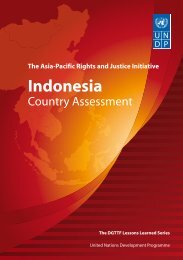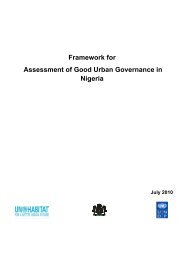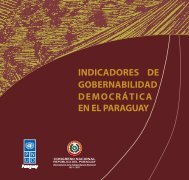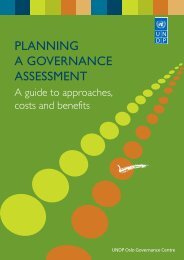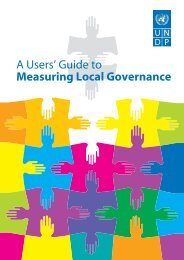English - UNDP
English - UNDP
English - UNDP
Create successful ePaper yourself
Turn your PDF publications into a flip-book with our unique Google optimized e-Paper software.
planning, and in the management and implementation of local<br />
development projects. The project strived to enhance local<br />
accountability, increase access to rural finance, and improve<br />
infrastructure and the delivery of basic services.<br />
Executive<br />
summary<br />
This report contains the findings of a review of three projects,<br />
funded by the Democratic Governance Thematic Trust Fund<br />
(DGTTF), in Tajikistan in 2006, 2007 and 2008. The review was<br />
conducted by an independent consultant. The projects were<br />
part of <strong>UNDP</strong>’s broad efforts to support the development of local<br />
governance and provide assistance to regional development<br />
in Tajikistan.<br />
The review examined the projects’ impacts within the context<br />
of history and political processes, relating specifically to local<br />
governance and regional development. It focused on the<br />
projects’ effectiveness, efficiency, innovation, catalytic effect, and<br />
sustainability. The report considers key underlying factors, drivers,<br />
and future scenarios, which provide a basis for determining the<br />
projects’ impact.<br />
Tajikistan is among the world’s least accessible countries. Its<br />
high, mountainous terrain and remoteness, compounded by<br />
a lack of infrastructure and a weak governance and regulatory<br />
framework, are significant barriers to external trade, connectivity,<br />
and investment. Its post-independence civil war (1992-97)<br />
resulted in substantial economic and human losses. The country<br />
remains the poorest of the former Soviet Union republics.<br />
About 53 percent of the total population, and up to 70 percent<br />
of people in isolated rural and mountainous areas, live below<br />
the poverty line.<br />
<strong>UNDP</strong> Tajikistan used a multi-sector approach to address poverty,<br />
rural, and local development. Work on poverty alleviation,<br />
decentralization, and local governance began in the aftermath<br />
of the civil war, and continued with the flagship intervention<br />
of <strong>UNDP</strong> Tajikistan Communities Programme (2004-2012). This<br />
programme supported the stated goals of the Government<br />
of Tajikistan to improve participatory processes by enhancing<br />
opportunities for community participation in local development<br />
The three projects supported through the DGTTF were integrated<br />
into a large <strong>UNDP</strong> Tajikistan poverty, rural development, and<br />
local governance portfolio, and were implemented within the<br />
Communities Programme framework.<br />
The first project, Clean Start for Local Councils – Building<br />
Accountability at the Local Level, began in 2006 with a<br />
total DGTTF contribution of US$200,000. It was designed to<br />
strengthen the capacity of local councils to perform their<br />
functions professionally, transparently, and accountably. The<br />
project also supported citizens’ participation in local decisionmaking<br />
processes through citizens’ report cards and the<br />
introduction of a Citizen Charter. The project helped to establish<br />
participatory planning mechanisms in the pilot districts.<br />
The project promoted an innovative approach to the delivery of<br />
public services by introducing new tools, such as citizen report<br />
card surveys and citizens’ charters. It also worked to build the<br />
capacity of district councils to comprehensively implement<br />
new functions deriving from the reformed legal framework.<br />
The project was implemented using the Communities<br />
Programme management and operational structure. This<br />
contributed to its effectiveness and efficiency, and all planned<br />
results were achieved within the planned timeframe.<br />
Its catalytic effect is found in its extension to the multi-donor<br />
funded Communities Programme (2007-2009). This programme<br />
had a total budget of around US$22 million, and was funded by<br />
<strong>UNDP</strong>, DFID, Asian Development Bank, CIDA, and GTZ.<br />
The participation of national partners in all project activities<br />
contributed towards a high level of sustainability. In addition,<br />
the Strategic Research Centre and the Institute for Civil Service<br />
Training adopted project results into their regular work and<br />
continued with implementation.<br />
DGTTF supported another project in 2007, Building national<br />
capacities for implementation of poverty reduction<br />
strategies, with US$130,000. This project developed a capacity<br />
development programme for elected representatives and civil<br />
servants from district and jamoat levels (third-level administrative<br />
divisions, similar to communes) to promote strategic planning<br />
for socio-economic development. This enabled district<br />
development plans to be prepared in three districts of Zarafshan<br />
Valley. In addition, the project assisted with the improvement of<br />
6




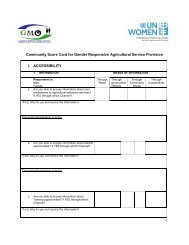

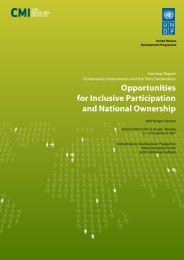
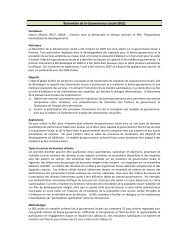
![GuÃa del Usuario ] - Governance Assessment Portal](https://img.yumpu.com/44740603/1/190x253/gua-a-del-usuario-governance-assessment-portal.jpg?quality=85)
